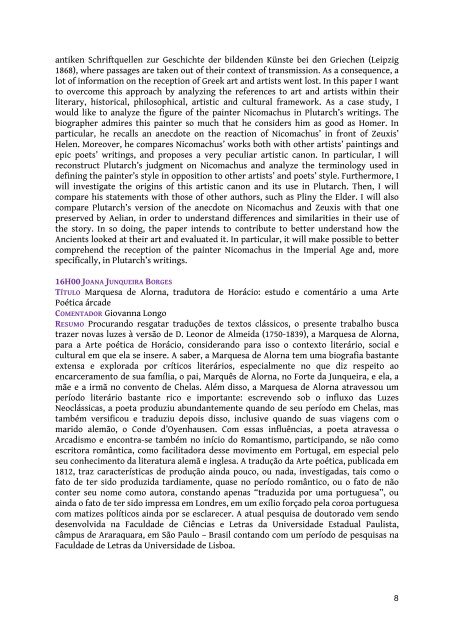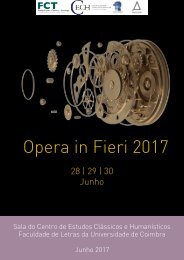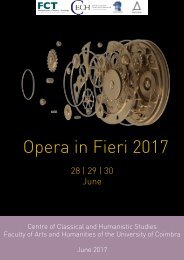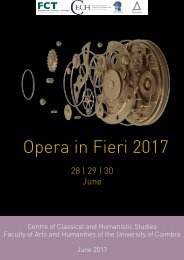Resumos PT
You also want an ePaper? Increase the reach of your titles
YUMPU automatically turns print PDFs into web optimized ePapers that Google loves.
antiken Schriftquellen zur Geschichte der bildenden Künste bei den Griechen (Leipzig<br />
1868), where passages are taken out of their context of transmission. As a consequence, a<br />
lot of information on the reception of Greek art and artists went lost. In this paper I want<br />
to overcome this approach by analyzing the references to art and artists within their<br />
literary, historical, philosophical, artistic and cultural framework. As a case study, I<br />
would like to analyze the figure of the painter Nicomachus in Plutarch’s writings. The<br />
biographer admires this painter so much that he considers him as good as Homer. In<br />
particular, he recalls an anecdote on the reaction of Nicomachus’ in front of Zeuxis’<br />
Helen. Moreover, he compares Nicomachus’ works both with other artists’ paintings and<br />
epic poets’ writings, and proposes a very peculiar artistic canon. In particular, I will<br />
reconstruct Plutarch’s judgment on Nicomachus and analyze the terminology used in<br />
defining the painter’s style in opposition to other artists’ and poets’ style. Furthermore, I<br />
will investigate the origins of this artistic canon and its use in Plutarch. Then, I will<br />
compare his statements with those of other authors, such as Pliny the Elder. I will also<br />
compare Plutarch’s version of the anecdote on Nicomachus and Zeuxis with that one<br />
preserved by Aelian, in order to understand differences and similarities in their use of<br />
the story. In so doing, the paper intends to contribute to better understand how the<br />
Ancients looked at their art and evaluated it. In particular, it will make possible to better<br />
comprehend the reception of the painter Nicomachus in the Imperial Age and, more<br />
specifically, in Plutarch’s writings.<br />
16H00 JOANA JUNQUEIRA BORGES<br />
TÍTULO Marquesa de Alorna, tradutora de Horácio: estudo e comentário a uma Arte<br />
Poética árcade<br />
COMENTADOR Giovanna Longo<br />
RESUMO Procurando resgatar traduções de textos clássicos, o presente trabalho busca<br />
trazer novas luzes à versão de D. Leonor de Almeida (1750-1839), a Marquesa de Alorna,<br />
para a Arte poética de Horácio, considerando para isso o contexto literário, social e<br />
cultural em que ela se insere. A saber, a Marquesa de Alorna tem uma biografia bastante<br />
extensa e explorada por críticos literários, especialmente no que diz respeito ao<br />
encarceramento de sua família, o pai, Marquês de Alorna, no Forte da Junqueira, e ela, a<br />
mãe e a irmã no convento de Chelas. Além disso, a Marquesa de Alorna atravessou um<br />
período literário bastante rico e importante: escrevendo sob o influxo das Luzes<br />
Neoclássicas, a poeta produziu abundantemente quando de seu período em Chelas, mas<br />
também versificou e traduziu depois disso, inclusive quando de suas viagens com o<br />
marido alemão, o Conde d’Oyenhausen. Com essas influências, a poeta atravessa o<br />
Arcadismo e encontra-se também no início do Romantismo, participando, se não como<br />
escritora romântica, como facilitadora desse movimento em Portugal, em especial pelo<br />
seu conhecimento da literatura alemã e inglesa. A tradução da Arte poética, publicada em<br />
1812, traz características de produção ainda pouco, ou nada, investigadas, tais como o<br />
fato de ter sido produzida tardiamente, quase no período romântico, ou o fato de não<br />
conter seu nome como autora, constando apenas “traduzida por uma portuguesa”, ou<br />
ainda o fato de ter sido impressa em Londres, em um exílio forçado pela coroa portuguesa<br />
com matizes políticos ainda por se esclarecer. A atual pesquisa de doutorado vem sendo<br />
desenvolvida na Faculdade de Ciências e Letras da Universidade Estadual Paulista,<br />
câmpus de Araraquara, em São Paulo – Brasil contando com um período de pesquisas na<br />
Faculdade de Letras da Universidade de Lisboa.<br />
8






